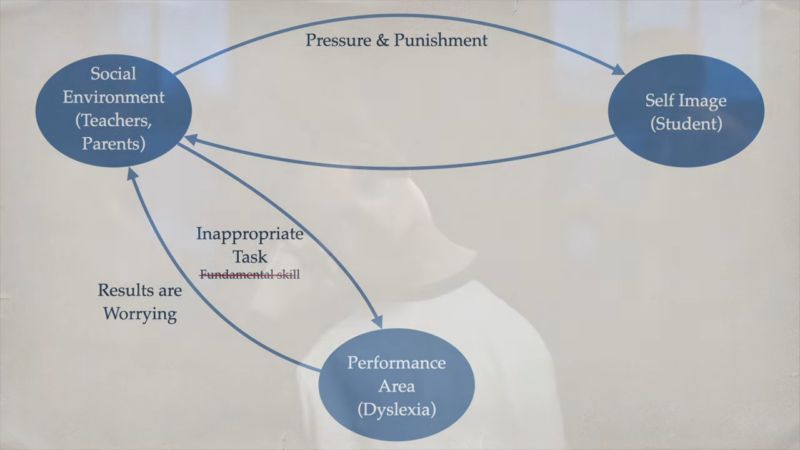Dyslexia is often thought of as something you’re born with, a condition that affects how your brain processes language.
Most people who have it carry this unique way of seeing the world from childhood onward. But can it show up later in life?
Turns out, the answer is more complicated than a simple yes or no.
Let me walk you through what I’ve learned, using the story of a writer named Ariane Resnick who developed dyslexia as an adult.
Dyslexia in Adulthood
According to Cleveland Clinic, most adults with dyslexia are born with it, typically discovering it during school when reading and spelling don’t come as easily as they do for others. Some even go their entire lives without realizing why they struggled.
But rare cases have shown that dyslexia can emerge later in life due to significant changes in the brain.
The main culprits? Things like injuries, illnesses, or even the natural aging process. Life has a way of throwing curveballs, and for some, that means facing new challenges with language and communication.
When Dyslexia Appears Unexpectedly

Ariane Resnick is a writer who had no issues with dyslexia for most of her life. As someone who wrote five books and read over 100 books annually, reading and writing were her superpowers. But in her mid-30s, everything changed.
Ariane’s dyslexia didn’t appear out of nowhere. A series of severe health events rewired how her brain worked. It started with late-stage neurological Lyme disease, which she managed to recover from using holistic methods. Then came carbon monoxide poisoning from a faulty HVAC system in her home, leaving her with brain damage.
These experiences altered her cognitive functions, including how she processed language. Although she recovered most of her brain function through dedicated holistic treatments, dyslexia stuck around as a lasting effect. Her symptoms included reordering letters, numbers, and even words when speaking or writing.
Tasks that once came naturally became a frustrating puzzle.
How Stress and Life Changes Affect Dyslexia

For Ariane, her condition wasn’t static. Life changes, like perimenopause, added layers of complexity. Hormonal shifts brought on brain fog, making her dyslexia worse temporarily. It’s a good reminder that dyslexia can feel more pronounced during times of stress or major life transitions.
According to a study, the normal aging process can lead to subtle, dyslexia-like challenges. Older adults sometimes find it harder to pronounce or repeat unfamiliar words, especially if they’ve never encountered them before. This isn’t always the same as full-blown dyslexia, but it’s related to how our brains process language as we age.
Living with Adult-Onset Dyslexia
Adjusting to a new normal is never easy, but Ariane approached it with humor and creativity. As a professional writer, she relied heavily on tools like Google Docs for its autocorrect features.
Yet, not every platform offered the same level of support, forcing her to get resourceful with add-ons and outside tools. Speaking was often easier for her than writing since she could adjust mid-sentence. But written communication required extra effort to ensure clarity, especially when working with editors and clients.
Challenges at Work
Modern workplaces aren’t always set up for people with cognitive differences. Many content management systems lack robust autocorrect features, which means more time spent proofreading and double-checking. For Ariane, this added extra steps to her workday but didn’t stop her from succeeding.
She also leaned into her community. By being open about her condition, she found support and understanding from colleagues, friends, and editors. She didn’t let her dyslexia define her or diminish her professional abilities.
Can Dyslexia Really Develop Later in Life?
The answer is yes, but it’s rare. Most people are born with dyslexia, but adult-onset cases like Ariane’s show it can develop due to specific triggers. Here are some of the ways dyslexia might emerge later in life:
- Brain Injuries: Trauma to certain areas of the brain can alter language processing.
- Neurological Conditions: Diseases like Parkinson’s can cause dyslexia-like symptoms, including difficulty with oral naming and language tasks.
- Aging: Older adults may struggle with phonological processing, which affects reading and language abilities.
Living and Thriving with Dyslexia
Ariane continues her writing career despite her dyslexia, proving that no condition has to limit what you can achieve. Dyslexia, especially when it shows up later in life, can feel overwhelming. But with the right mindset and support, it doesn’t have to hold you back.
If you’ve faced similar challenges or know someone who has, remember: you’re not alone. Life is full of twists, but there’s strength in how we respond to them.
Sources
- Cleveland Clinic – Dyslexia
- Taylor & Francis Online – Ageing makes us dyslexic
- Very Well Mind – I Became Dyslexic in My 30s—Here’s How I Deal

